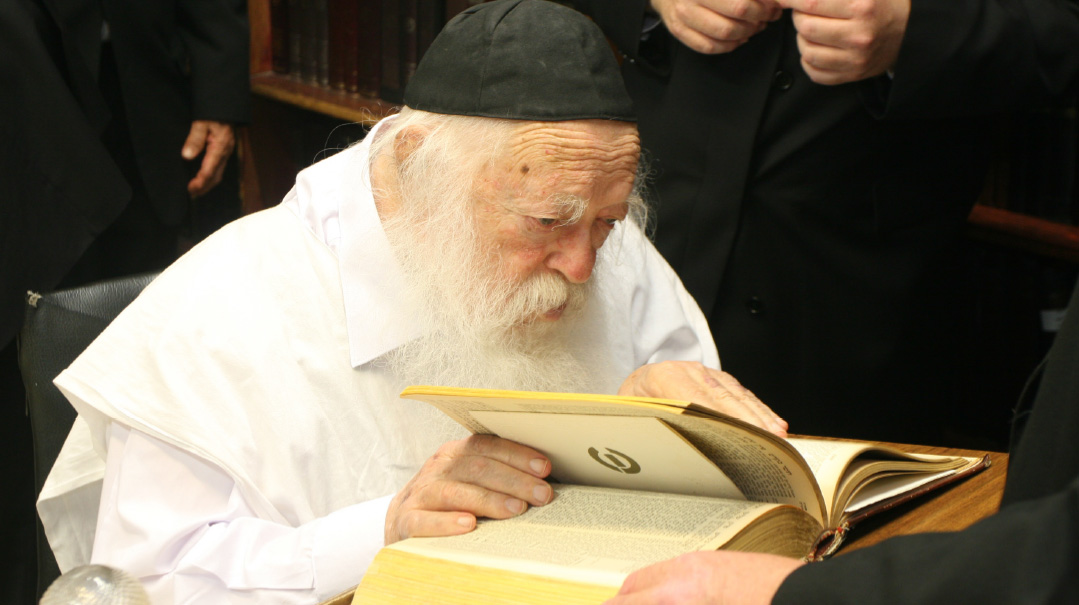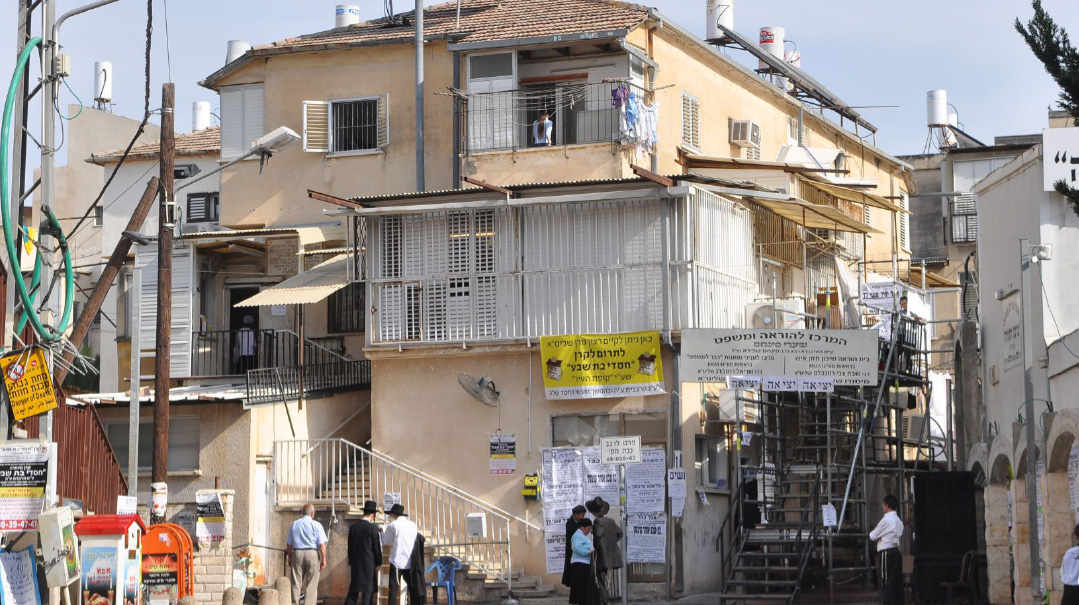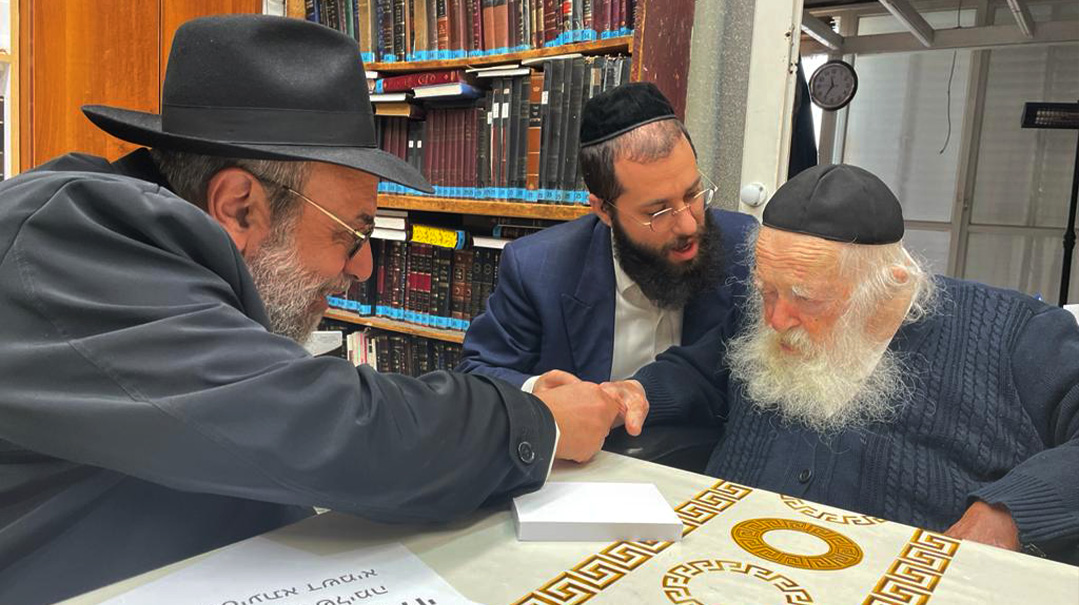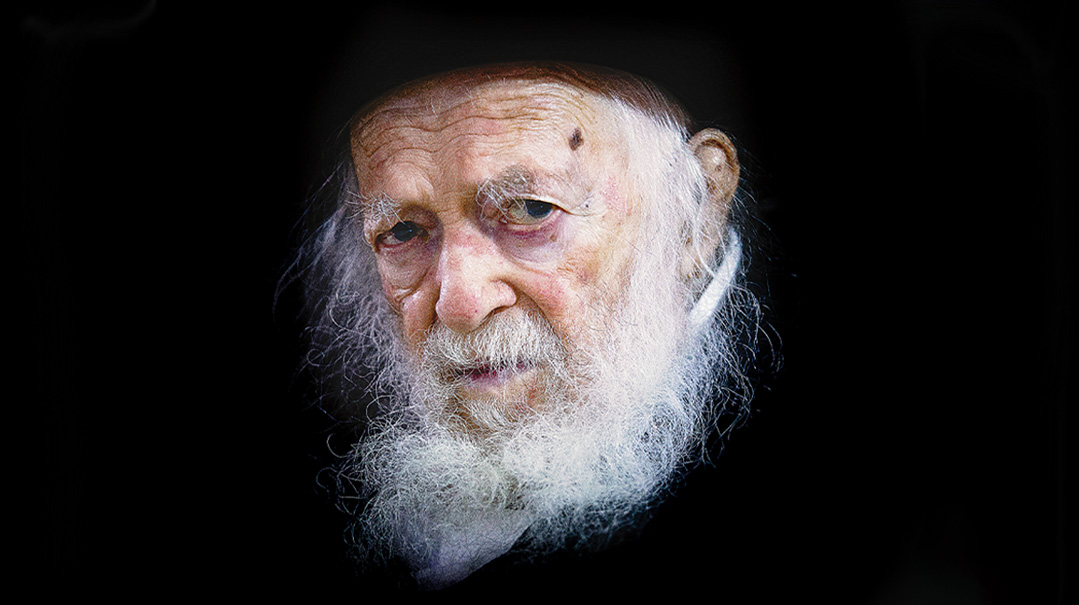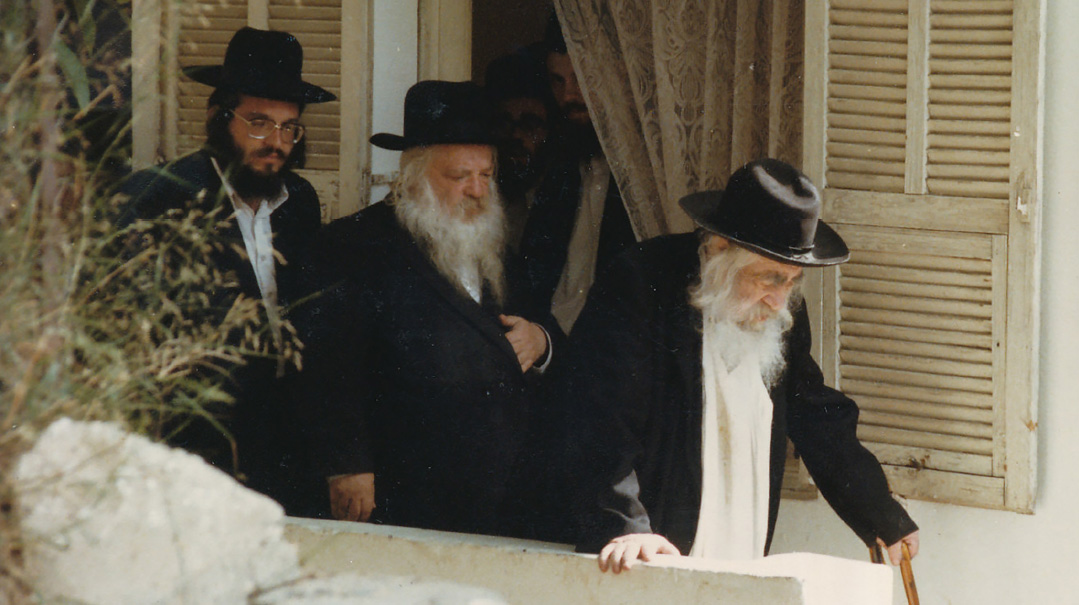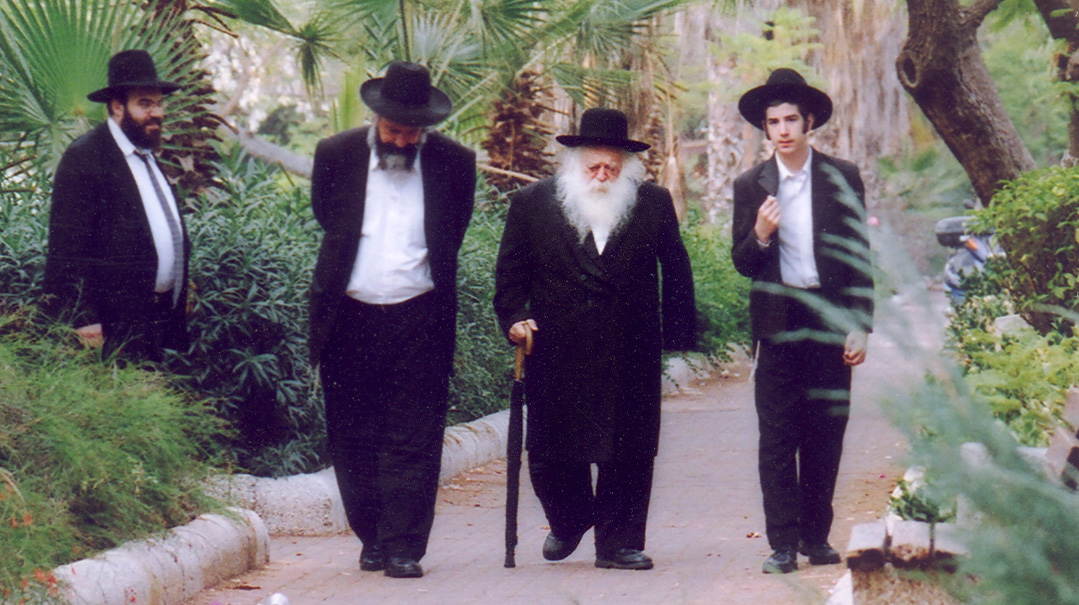Because Rav Chaim Said

Although the instructions often sounded extreme or the phrases inscrutable, if Rav Chaim said it, gates of salvation would open
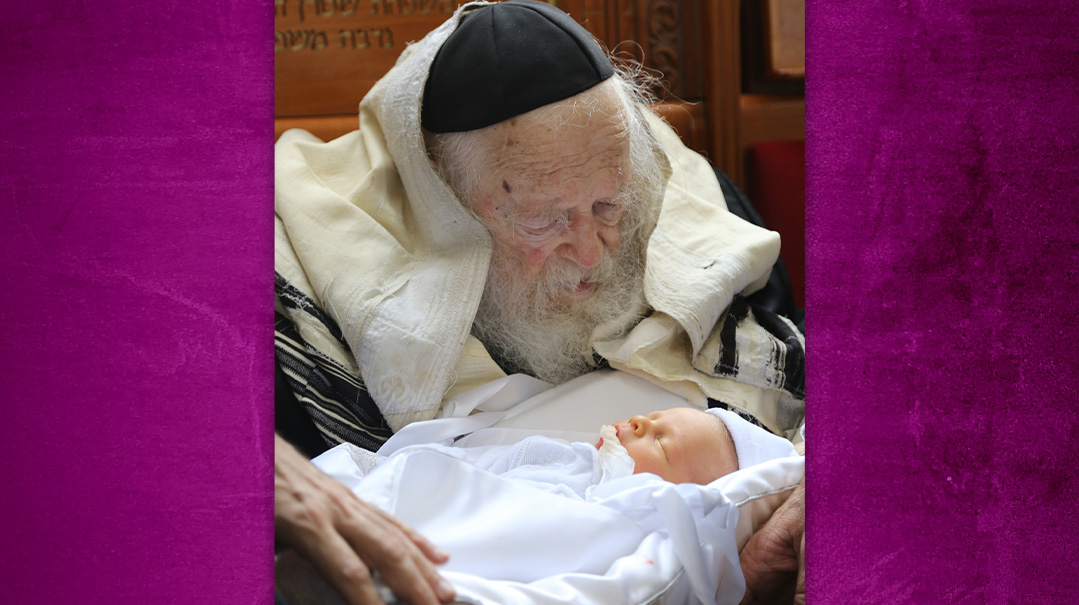
Photo: AEGedolimphotos.com
Sometimes following the directive of a gadol seems counterintuitive. Don’t the doctors know better? Doesn’t my sechel tell me otherwise? How can I trust someone who isn’t politically savvy? But both staunch adherents of Rav Chaim, and tens of thousands of others who visited for a brachah or eitzah, knew that although the instructions often sounded extreme or the phrases inscrutable, if Rav Chaim said it, gates of salvation would open
Miracle Baby
The doctors said our baby would die. Would I have enough faith to believe in Rav Chaim’s blessing for life?
As told by Shaul and Rachayli Klein to Ariella Schiller
Shaul and I found out we were expecting when I was already 18 weeks along. We were excited about our upcoming addition. But our elation was short lived. After an ominous ultrasound reading, we found ourselves sitting in front of the department head, Professor Simcha Yagel.
“Due to a lack of amniotic fluid,” he said, “the baby’s lungs haven’t developed. They’re just two rocks in his chest. He’s getting oxygen through the umbilical cord, but chances are that when the cord is cut, he’ll die.”
I stared at this man as he outlined the birth and consequent death of my unborn child.
“Also, due to the lack of fluid, we have little contrast on the screen and can barely see the baby. If he lives, he’ll most probably be deformed, missing limbs and mobility. He’s being crushed in the womb, and again, if he lives, his arms and legs will permanently stay crushed. This baby won’t survive — this pregnancy will end, one way or another.”
We were scheduled for genetic testing on Monday. On Sunday, Shaul had an appointment to see Rav Chaim Kanievsky. Our rav, Rabbi Shmuel Weiner, accompanied him; together they wrote a letter for Rav Chaim, explaining the situation. Before entering, Rabbi Weiner turned to Shaul.
“Rav Chaim might make certain demands of you,” he stated. “And if he does, you need to be prepared to follow through on what he says.”
Shaul agreed.
Rav Chaim read the paper and looked up.
He gave no brachah. Instead, he said: “Don’t listen to the doctors. Everything will be okay. Don’t go for any tests. And daven.”
My husband looked down at the paper. It made no mention of tests. He looked up at Rav Chaim again.
“Should I do anything in particular?” he asked.
“Daven as much as you can,” Rav Chaim said. “Everything will be okay.”
My husband skipped into the house later. Joyfully, he told me what had occurred in Bnei Brak.
I was shocked. My father is a doctor. Most of my family’s in the medical field. Don’t do any of the tests? I broke down.
“Shaul,” I said, “we can’t not do the tests. What about hishtadlus? What if there are in-utero surgeries to be done? Rav Chaim spoke to you for five minutes. Maybe he didn’t understand what you meant. He’s not a doctor!”
Shaul looked at me. “But Rav Chaim said everything will be okay!”
I tapped into my emunas chachamim and agreed to go along with Rav Chaim’s instructions. At 26 weeks, I was hospitalized, at 32, I went into labor. They prepped me for the birth and death of my child. The surgery was quick and it was followed by harrowing silence. Shaul and I looked at each other in despair… and then we heard it. The thin wail of a newborn. Shaul ran to look, but there were too many doctors around. He jumped, snapped a picture, and ran back to me. We looked at his phone together.
“It’s a baby,” I whispered.
A gorgeous baby with jet black hair and — we zoomed in — ten fingers, ten toes, four limbs, one squished little nose. And tubes. Lots and lots of tubes. But it was a baby. A whole baby!
When he was six weeks old, he had his bris.
Rav Chaim was sandek. He smiled at our miracle baby, and it was a brachah of its own.
Today, our Shlomo is three years old. He just had his upsherin, loves to play with his siblings, eat endless snacks, and ride his tricycle. A “regular” toddler.
He fills our life with joy. It’s the sort of joy that comes from tasting reward in This World for making giant choices with emunas chachamim.
For Another Reason
Discounting a shidduch isn’t simple. We couldn’t do it without Reb Chaim’s guidance
By Malka Greenberg
WEare a family of chassidim whose children study in mainstream litvishe mosdos. My youngest daughter, Gitty, had been in shidduchim for a while, but nothing seemed to materialize. She was a wonderful girl, happy, with good middos, and very bright. She was adamant that she wanted a serious, full-time learner, who also was connected to our chassidus.
Just before I was scheduled to fly to New York to visit my elderly parents, a shadchanit we had worked with in the past suggested a boy who, she said, had everything we were looking for. He’d also been in school with our son Meir, now married, who had positive memories of him as a really good boy, and this was another reason that we were inclined to look favorably on this shidduch.
I told the shadchanit that I would be back in two weeks, and then I would start to make inquiries. But she said it was a shame to put off such a good proposal, so my husband checked out the boy and heard very good things.
During my absence, my daughter went out twice. I was in frequent contact with her and things seemed to be moving in a positive direction. After the third date, which took place just after my return from overseas, the boy’s parents called us and asked to meet us. We were sure that they wanted to talk about financial matters, so it came as a real shock when they informed us that the boy had suffered a serious medical issue as a child and that he continued to take a very mild medication. After delivering the bombshell, they hurried to qualify that the illness had left no adverse effects whatsoever on his health today. They invited us to speak to his doctor, who, they said, would reassure us that the boy had a clean bill of health.
They explained that they’d waited until now because they wanted to tell us the truth before things became too serious. On the other hand, they’d been instructed by their rav not to disclose this information in advance because it would harm their son’s chances for a decent shidduch.
My husband told the parents that we needed to think, and that we would be in touch with them. They repeated that we must speak to the doctor so that we’d understand that their son was in excellent physical health and that we had nothing to worry about in that area.
My initial feeling was to drop the whole thing. Why should we even consider such a thing for our daughter? However, my husband was more thoughtful. “If Hashem brought this to our doorstep, it means that it’s ‘ours.’ No, no, I didn’t say we have to agree to the shidduch,” he said in answer to my cries of protest. “What I mean is that we need to think about this carefully and not get carried away by our emotions. Just because the boy had a serious illness, it doesn’t mean that we have to discount him.”
We decided to hear what the boy’s doctor had to say, after which we’d ask Rav Chaim Kanievsky how to proceed.
Considering the parents’ repeated assurances, we were surprised when the doctor wasn’t at all cooperative. “What do you think I am, a shadchan?” he said, clearly irked. “In any case, I have no permission to divulge medical information about a patient.” Then he hung up.
The parents sounded uncomfortable when we told them what had transpired, but continued to insist that there was no medical reason to stop the shidduch.
Meanwhile, my husband went to Rav Chaim and told him the story, explaining our uncertainty regarding the boy’s health. Rav Chaim didn’t ask any further questions. He just said, in these exact words, “If the shidduch isn’t meant to be, it will fall for a different reason.”
Before we could even mull over what Rav Chaim had said, we received a phone call from Meir. It turned out that this wasn’t the same boy he remembered, but his brother! And from what Meir had heard, this boy was far from being the serious learner that our Gitty had been looking for — the “different reason” that Reb Chaim had clearly alluded to.
The Price Was Right
I was a poor chassan. Why would Rav Chaim tell me to look for an apartment in expensive Bnei Brak?
As told to Eliezer Shulman
Rav Chaim might have been the leader of the litvishe world, but today people repeat stories that make him sound more like a chassidish miracle worker. And I’m one of them. I came to Rav Chaim before my wedding, telling him how we had very little money but needed to find a place to live.
Rav Chaim asked, “What’s the maximum resources you can put together?”
I told him, “Forty thousand dollars.”
Rav Chaim instructed me, “Look for an apartment in Bnei Brak.”
I was quite surprised, and tactfully explained to the Rav that there are no apartments in Bnei Brak for that price.
But Rav Chaim was adamant. “Look,” he instructed.
So I did. I went to a real estate agent and said, “I wouldn’t come with this request, but Rav Chaim Kanievsky sent me. Maybe you can let me know if there is anything available for $40,000.”
A week later, I got a call from the agent. “You won’t believe this, but a sick, elderly man lives alone in a four-bedroom apartment in Bnei Brak. He needs a dialysis machine. He’s willing to have a couple live in his apartment with their own private entrance, and after he dies, they’ll inherit the apartment — if they give him $40,000 to buy a home dialysis machine.”
I couldn’t believe the offer. I immediately ran back to Rav Chaim, who told me to accept the offer.
I bought the machine for the elderly man, but a week before the wedding, he passed away — and, as agreed, we inherited the apartment. And we even recouped our $40,000 when we sold the dialysis machine.
Stretch Yourself
Why not grow a beard if it will save your life?
By Naftali Weinberger
Many years ago, I became close to Rav Chaim after he directed me through a personal issue with a special segulah, and since then, although I live in Lakewood, I generally come to Bnei Brak four to five times a year. I’m close with the family and love being around them, and when I released my book on the Rebbetzin a”h, people realized that I had a connection and would often contact me for assistance in getting into the Rav. In fact, I’ve been privileged to escort friends and acquaintances, and can testify to yeshuos I’ve personally witnessed. Sometimes it’s just about moving a little out of one’s comfort zone.
True, some of them sound like fairy tales, but they are all unembellished and accurate. I know, because I was there.
In one instance, a friend of mine who was working in finance in a high-powered firm — what you call a “modern” guy, clean-shaven with a corporate-style, small, brown leather yarmulke — was diagnosed with a very serious case of metastasized cancer. We traveled to Eretz Yisrael together, and he came into Rav Chaim, crying, humbled, begging for a brachah.
Rav Chaim seemed unconcerned. “You should grow a beard,” he told my friend emphatically. My friend was taken aback. “A beard? In my firm, I had to get special permission just to wear a yarmulke! There’s no way they’ll let me grow a beard. Also, my wife will never agree.”
Now, Rav Chaim is not usually so assertive and straightforward, but this time he wouldn’t relent.
“Neither your wife nor your company wants a dead husband or a dead employee,” he said.
Well, my friend did it, and had what can only be described as a miraculous refuah sheleimah. Today, he’ll never dream of shaving, and even if he does, his wife won’t let him.
Another story I was involved with happened seven years ago, in the last shemittah year. Someone I knew got into huge trouble with the IRS and was facing federal criminal liability and a long jail term. He was in a deep, deep mess and was a nervous wreck by the time I accompanied him to Rav Chaim.
Rav Chaim that he should learn Hilchos Sheviis, the laws of shemittah, even though he was going back to America. He readily agreed, and then asked the Rav if there was anything else he could do to tip the scales in Shamayim.
Rav Chaim told him, “Shemittah has a special koach. You should help farmers who are keeping shemittah.”
So my friend began learning Hilchos Sheviis and supported several farmers. As soon as shemittah was over the next Rosh Hashanah, he got a letter in the mail from the IRS offering a settlement — a lot less than he was paying his attorney — and he’d be off the hook.
Naftali Weinberger is the author of the books Rebbetzin Kanievsky, Rav Chaim Kanievsky on Shidduchim, and Reb Aharon Leib.
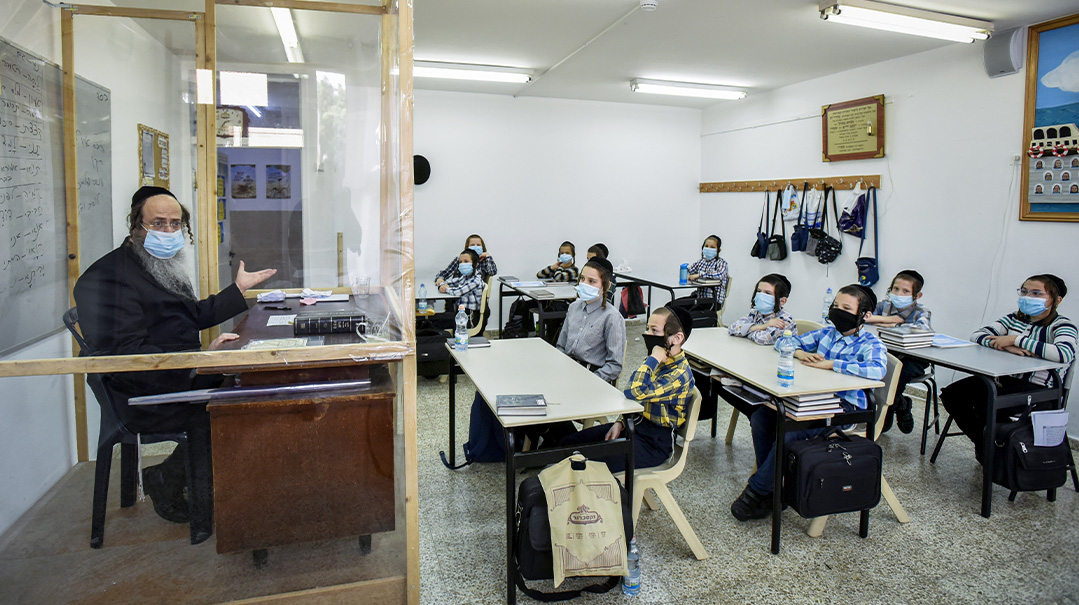
Photo: Flash 90
Open-and-Shut Case
It was the height of Covid, and schools were closed. But Rav Chaim had daas Torah on his side.
By MK Rabbi Yitzchak Pindrus
Iwas waiting for the fallout, and it was predictably fast in coming. My phone was ringing, texts were flying, as every news outlet wanted a comment about Rav Chaim’s “irresponsible” decision to reopen the chadarim when the country was in the thick of a Covid lockdown and all schools shuttered. I was the “voice,” and I had to present a face of responsibility and balance to an already hostile public, who were accusing us of being “disease vectors.”
But this was the thing with Rav Chaim: People think that to make wide-reaching political or societal decisions, you have to read newspapers, listen to news analyses, and be involved politically. But Rav Chaim understood that if the Torah is really a blueprint for our lives, if you’re steeped in Torah, the answers will be there. The less you’re involved in politics and the more you’re involved in Torah, the clearer your Torah vision.
Rav Chaim, as we know, was kulo daas Torah. And that’s why the political sector galvanized to try to convince him to close the chadarim and yeshivos during Covid. (In the beginning he did agree to close them for a short time, but long before the rest of the country, he called for their reopening.) They brought doctors and experts and graphs and statistics, and even a team of well-known frum medical askanim, but none of that swayed Rav Chaim, because he only looked into Torah — and he decided that the Torah said not to close the mosdos. People thought, Rav Chaim is saying this because he doesn’t understand what Covid is, he’s totally removed, what does he know about what’s going on in the world?
I, personally, was in a very uncomfortable position, because truthfully, it was difficult to go to the press and explain it. I remember going to the main television channels when many of my colleagues were afraid to get into the public debate because of the accusations being hurled at us, that we were “corona spreaders,” and I admit it was challenging not to fall into the trap of becoming an apologist.
In the end, it was a great kiddush Hashem, but that’s with hindsight. In the process, we just knew we were following daas Torah.
Today professionals across the board admit that closing the schools caused extensive damage with far-reaching implications — educationally, psychologically, socially, and morally. Some of those institutions that closed down — including yeshivos — fell apart, bochurim fell apart.
Today there’s a consensus that institutions for kids have to remain open. And you see, in the end, despite the “fourth wave” and the “fifth wave,” Bennett kept everything open and no one attacked him — people were secretly happy and relieved.
The Torah doesn’t try to figure out what’s politically correct, it just tells us how to do what we have to do. What I learned from Rav Chaim’s leadership was that true conviction lies with those who understand Torah, even if they don’t understand politics.
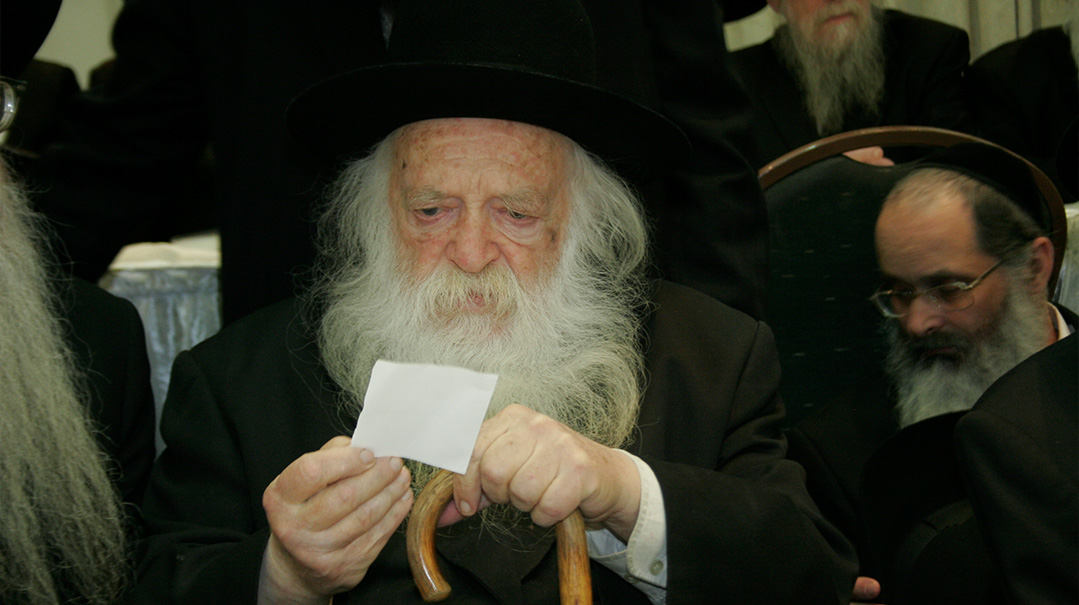
Photo: Mattis Goldberg
Cryptic Command
How did Rav Chaim know our son needed the intervention of his holy zeide?
By Bracha Weissman
WEwere in Eretz Yisrael for a sibling’s wedding. We were based in Yerushalayim, but one evening, on the way home from a day trip, we stopped by Bnei Brak to get a brachah from Rav Chaim.
My husband showed Rav Chaim the list of our children’s names. He separately asked for siyata d’Shmaya for my young son who was struggling with kriah and was therefore very unmotivated when it came to davening or learning.
Rav Chaim skimmed the names and stopped at that son’s name, noting what a heilige name it was before saying, “Nu, go to the zeide. Daven there for his hatzlachah.”
We hadn’t told Rav Chaim that our son was named for our pious zeide — a man who was moser nefesh for the Eibeshter and for the kehillah he brought closer to Yiddishkeit, his life literally at risk from hostile secular neighbors who didn’t appreciate the beautiful metamorphosis unfolding in their community.
We hadn’t told him that our zeide was buried right there in Bnei Brak.
And we certainly hadn’t told him that our zeide’s yahrtzeit fell that very night.
Even though we were tight for time and were already late for sheva brachos back in Yerushalayim, we knew we had to follow Rav Chaim’s advice. My husband mentioned to one of the gabbaim that we’d go straight to the cemetery, as per the gadol’s words, even though it wasn’t on the plan and totally out of our comfort zone to go to in the middle of the night.
The gabbai saw our hesitation and commented, “If you’re going because Rav Chaim told you to, don’t. He doesn’t approve of going to a beis hachayim at night. Better come back tomorrow.”
The next day we were flying home and would barely have time, but we set out extra early to pour our hearts out by our holy zeide, to light candles and daven on his yahrtzeit, literally catching our breath only when we reached Ben-Gurion.
Four years later, our son loves learning, scores top marks, and insists on staying in shul Shabbos morning from start to end — often the last kid still inside.
Reflecting on that encounter now, I’m confident it had to do with Rav Chaim’s cryptic blessing to pull strings at the gravesite of our son’s saintly namesake, today a stone’s throw from the Sar HaTorah’s freshly dug grave.
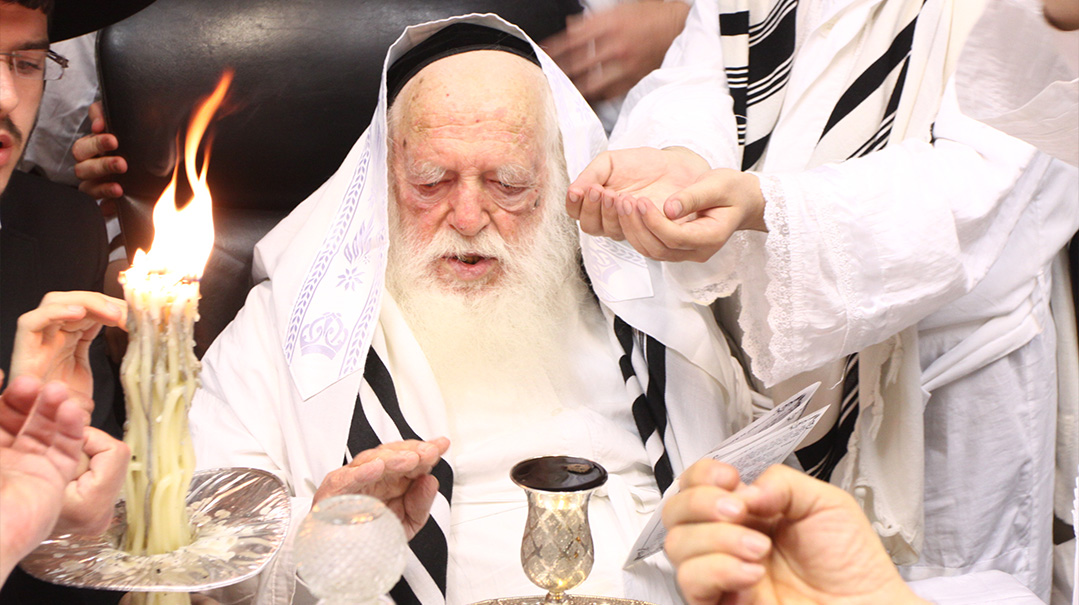
Photo: Mattis Goldberg
Changing Directions
Two “small” segulos gave my son a family
By A Grateful Bubby
Our son Hershy and his wife had been married for three years and had suffered through just as many miscarriages. After the last loss, my husband went to Rav Chaim to ask for a brachah and an eitzah, and the Rav quoted the Gemara that a person shouldn’t have his bed in a west-east direction. Sure enough, their beds had been in that direction, and that same day, he moved them to face north-south. Baruch Hashem, they were zocheh to a beautiful daughter exactly ten months later.
After three beautiful daughters, Hershy went to Rav Chaim to ask for a brachah for a son. Rav Chaim told him to make Havdalah over wine. Sure enough, the next child was a gorgeous son. A couple years later, they had another wonderful girl. Not that we have anything against girls, but I knew they’d been hoping for another boy. I asked my son if he was still making Havdalah over wine.
“Actually, Ma, wine gives me a headache, so I went back to using grape juice,” he said.
Back from the Brink
I was about to give the get, when two words changed our family’s reality
By A Dedicated Husband
Iwas sitting with my chavrusa Friday morning when the text came in. Rav Chaim had passed away, and spontaneously, I broke down and cried.
I cried about the man who, with two cryptic words, changed the course of my life. I cannot fathom what my life would have looked like without two words uttered by that tzaddik. Let me explain:
After 11 years of marriage, four children, and many, many hours of counseling, I’d had it. I’m not assigning blame, but it had become clear to me that my marriage was no longer viable. I had already been separated from my wife for an extended period, and realized that this simply could not work. I felt terrible — for my children, for myself, and even for my wife, but I’d had enough. My wife and I spoke to a lawyer, and after much haggling back and forth, the financial and custody issues were settled. We scheduled a time with the beis din for a get.
But then, two days before the get was to be given, a rav who had been serving as marriage counselor suggested we speak to Rav Chaim. I agreed, so I got on a bus and traveled to Rav Chaim in Bnei Brak, who responded with two cryptic words: “machzir gerushaso — he will remarry his divorcee,” which left me confused. What did Reb Chaim mean? But there was no further clarification. (Reb Chaim in fact writes in Orchos Yosher that at times Hashem sends words into the mouth of the tzaddik that he himself does not understand. It is a form of ruach hakodesh.0 I could only conclude one thing: that if I got divorced, I would end up remarrying my wife in any case, which meant the get really seemed like an exercise in futility.
I placed my faith in the gadol hador and resolved that no matter what, I’d make my marriage work… and as all those who know me and my family can attest, it has, more wonderfully than I could have imagined. Our children celebrated our reunification, and we both have worked very hard to rebuild our relationship. Now, many years later, I can see it was the best decision I ever made. For sure, there are still challenging times, but that’s true for every marriage. Our household is full of life, my wife and I take pride in our accomplishments of figuring it out, and we serve as a role model for other couples contemplating divorce. My wife and I spend time speaking with other couples who are having it rough, showing them that reconciliation, shalom, and rebuilding are actually within reach.
Where would my life be without Rav Chaim? I cry as I contemplate the thought. He gave me, my wife, and my children life, love, and simchas hachayim… and we are forever grateful. Yehi zichro boruch.
(Originally featured in Mishpacha, Issue 904)
Oops! We could not locate your form.

